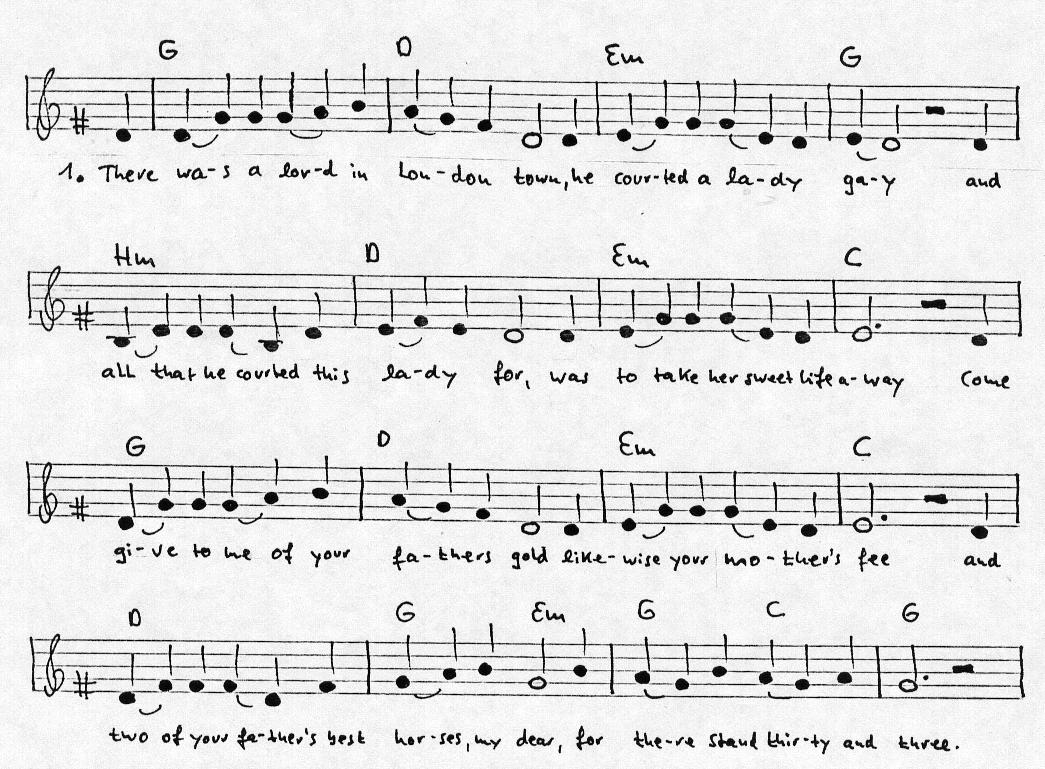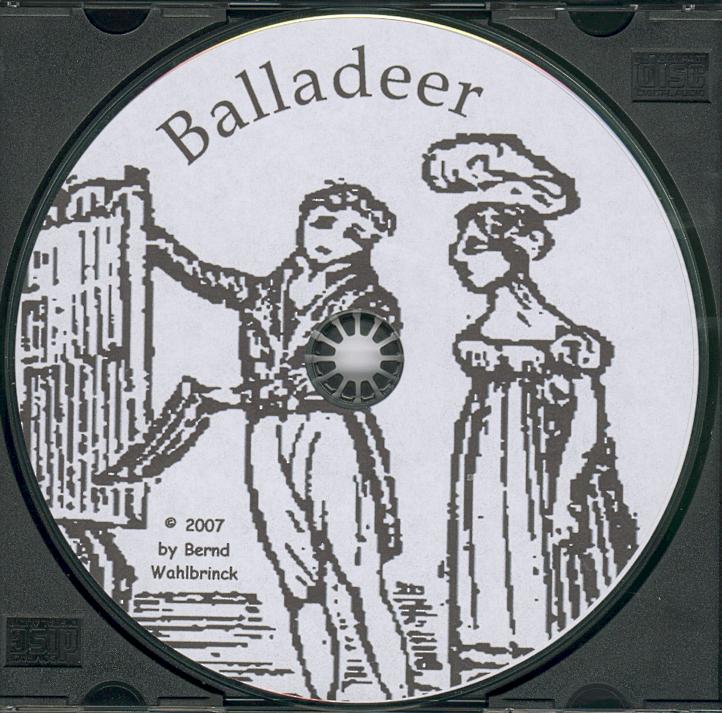
|
BALLADEER - CD - |

|
The ballad — a story told in verse — is one of the oldest forms of popular
entertainment. Long before the invention of printing, ballads were
transmitted from person to person as they were sung. |
*

*
|
Reviews ... This is homerecording material from the Saguaro & Tumbleweed Studios at the Home of the Wadel - not necessarily ultra-professional, but good music nonetheless, not to mention the outstanding lyrics. Ben Jamieson in the Atlantic Monthly, January 2007 * ... Actually, the first six ballads have been recycled from earlier compilations, e.g. the Deja Vu album (2000) and The Lost Basement Tapes (2005). However, the last song, "The Listeners", which is allegedly a bootleg, is new and vintage Wahlbrinck. I have a hunch Walter de la Mare would have loved it too. Carl Monk in West Coast Sounds, February 2007 * ...
It is already amazing, with which insolence Mach-works
some contemporaries their musical again and again as alleged "again"
publishes. Most comes one with this just on the market thrown disk of
Bernd Wahlbrinck nevertheless all too admits here forwards - with the
title "Deja Vu" can concern it thus only involuntary irony. Heinrich Kruip in Neue Volkslieder & Balladen, February 2007 NOTE: This is the translation of the original German review by the renowned Babelfish translation program. It may not be entirely accurate. Here is the German text itself:
... Es ist schon erstaunlich, mit welcher
Unverfrorenheit manche Zeitgenossen ihre musikalischen Machwerke immer
wieder als angeblich "neu" veröffentlichen. Das meiste kommt einem hier
bei dieser soeben auf den Markt geworfenen Scheibe von Bernd Wahlbrinck
doch allzu bekannt vor – bei dem Titel "Deja Vu" kann es sich somit nur um
unfreiwillige Selbstironie handeln. * |
*
TRACKS
1. LADY ISABEL & THE ELF KNIGHT
Music: Bernd Wahlbrinck (1984)
Lyrics: North American Popular Ballad
available on youtube
2. THE DEATH DANCE
Music: Bernd Wahlbrinck (1985/1990)
Lyrics: Johann Wolfgang von Goethe
transformed into English by Bernd Wahlbrinck
now available on youtube (not
in stereo though)
3. THE JEALOUS LOVER
Music: Bernd Wahlbrinck (1985)
Lyrics: North American Popular Ballad
4. THE CASTLE BY THE SEA
Music: Bernd Wahlbrinck (ca.1987)
Lyrics: Ludwig Uhland
transformed into English by Bernd Wahlbrinck
5. DÉJÀ VU
Music & Lyrics: Bernd Wahlbrinck (1994)
6. HANS BREITMANN'S PARTY
Music: Bernd Wahlbrinck (2000)
Lyrics: Charles Godfrey Leland
now available on youtube
7. THE LISTENERS
Music: Bernd Wahlbrinck (ca. 1987/2007)
Lyrics: Walter de la Mare
now available on youtube
*
All vocals, guitars,
keyboards, drums, kazoo:
Bernd Wahlbrinck
Recorded at the
Saguaro & Tumbleweed Studios
Home of the Wadel
Germany
*
LYRICS
|
|
|
Hark! It
is midnight The limbs
start dancing There's
rattling and clacking The
dance, it is over The
shroud he must have The
sexton is shaking
|
DER TOTENTANZ Der Türmer, der schaut zu
Mitten der Nacht Das reckt nun, es will sich ergetzen sogleich, Nun hebt sich der Schenkel, nun wackelt das Bein, Getan wie gedacht! und er flüchtet sich schnell Nur einer, der trippelt und stolpert zuletzt Das Hemd muß er haben, da rastet er nicht, Der Türmer erbleichet, der Türmer erbebt,
|
|
NOTE: There is a link to an interview with Bernd Wahlbrinck concerning the collaboration with Goethe on this song. The interview is in German. |
|
*
|
|
*
|
Did you not see with wandering clouds of gold above it That towering castle standing down there by the sea? Trying to melt into its image in the clear waves Trying to rise into the evening clouds so free.
You may be sure I did behold that castle The moon above and veils of mist floating around. But the winds and all the waves they were so silent A plaintive song the only woeful sound.
Then you did see the queen and the king consort And their fair daughter standing on the balcony? Though I did see the parents' long black garment That fair young lady I did not see.
|
DASS SCHLOSS AM MEER
|
*
|
in ancient times
DEJA VU
up in the sky
DEJA VU
a butterfly DEJA VU
|
*
|
* 1. Hans Breitmann gife a barty; Dey had biano-blayin', I felled in lofe mit a Merican frau, Her name vas Madilda Yane. She hat haar as prown ash a pretzel, Her eyes vas himmel-plue, Und vhen dey looket indo mine, Dey shplit mine heart in dwo. * 2. Hans Breitmann gife a barty, I vent dere you'll pe pound; I valtzet mit Matilda Yane, Und vent shpinnen' round und round. De pootiest Fraulein in de house, She vayed 'pout dwo hoondred pound, Und efery dime she gife a shoomp She make de vindows sound. * 3. Hans Breitmann gife a barty, I dells you it cost him dear; Dey rolled in more ash sefen kecks Of foost-rate lager beer. Und vhenefer dey knocks de shpicket in De deutschers gifes a cheer; I dinks dot so vine a barty Nefer coom to a het dis year. * 4. Hans Breitmann gife a barty; Dere all vas Souse and Brouse, Vhen de sooper comed in, de gompany Did make demselfs to house; Dey ate das Brot and Gensy broost, De Bratwurst and Braten vine, Und vash der Abendessen down Mit four parrels of Neckarwein. * 5. Hans Breitmann gife a barty; Ve all cot troonk ash bigs. I poot mine mout' to a parrel of beer, Und emptied it oop mit a schwigs; Und den I gissed Madilda Yane, Und she shlog me on de kop, Und de gompany vighted mit daple-lecks Dill de coonshtable made oos shtop. * 6. Hans Breitmann gife a barty -- Vhere ish dot barty now? Vhere ish de lofely golden cloud Dot float on de moundain's prow? Vhere ish de himmelstrahlende stern -- De shtar of de shpirit's light? All goned afay mit de lager beer -- Afay in de ewigkeit!
|
*
|
7. THE
LISTENERS 'Is there
anybody there?' said the Traveller But no
one descended to the Traveller Stood
thronging the faint moonbeams on the dark stair For he
suddenly smote on the door, even Ay, they
heard his foot upon the stirrup
|
|
NOTE: "The Listeners" is one of the most outstanding and beautiful examples of a so-called slice of life story - see the article I started at Wikipedia: Slice_of_Life_Story |
|
NOTE: His poem, 'Thomas Hardy', celebrates a visit de la Mare made to Hardy's house, Max Gate, in Dorset in June 1921. Hardy was an important influence on de la Mare's sensibility and for his part, Hardy esteemed the younger writer, so much so that a few day before he died, Hardy asked his wife to read him 'The Listeners' and afterwards said "That is possibly the finest poem of the century." |
*
Contact: Bernd Wahlbrinck